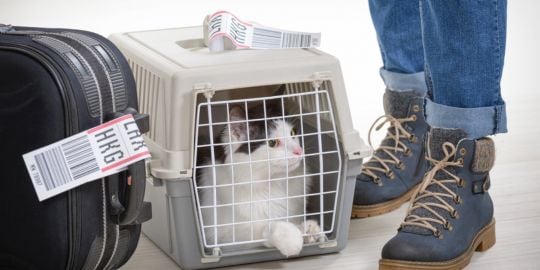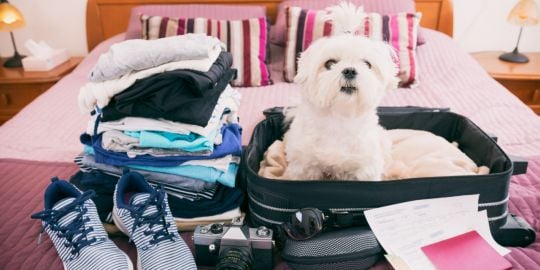Choose the appropriate destination
In the COVID-19 era, some countries are much more appropriate for potential expats. Obviously, it all depends on what motivates you to move abroad. For example, the United Arab Emirates remains an ideal destination for those who are looking to boost their career abroad, not only for its economic resilience, the professional opportunities available there and benefits to which expats are entitled but also for the ways in which the government dealt with the health crisis. Australia and New Zealand are gradually reopening their borders to foreign professionals, under certain conditions. In short, it's highly recommended that you consider your host country's current situation and the measures taken to contain the pandemic.
Find suitable accommodation
Finding accommodation will be one of your priorities. But beware! Chances are that your host country's real estate market has been affected by the global health crisis. So check whether rent and sale prices have risen or dropped in recent months. If prices have dropped, especially if you're looking to make a long stay in your host country, consider buying a house or an apartment. Depending on your family status, this may be the cheapest option in the long run. However, make sure that the accommodation you have chosen is in a COVID-safe area. Also, check whether you need to get an internet connection, in case you need to work remotely.
Gather essential documents
Have you checked whether you're eligible to relocate to your the country of your choice? Do you have the profile and the documents required to be admitted? As a professional, are your skills in demand in your expat country? Are your diplomas recognised? Do you have a valid passport? If not, consider renewing it before applying for a visa. What about your driver's license? If you're planning to rent or buy a car in your host country, you will need an international license. Start by reuniting all your important documents, including your birth certificate and those of your family members if they will accompany you, your family booklet, identity photos, and make copies of them. Sworn translations of your diplomas or other important documents may also be required. Keep a copy of your documents in your mailbox. Once you have all of them within hand's reach, you can apply for a visa or residence permit and book your flight tickets once your request is accepted.
Plan your finances
Most banks have gone entirely online during the crisis, so you can even open a bank account remotely. In fact, in some countries, banks have a limited number of branches open during the crisis. However, make sure that your chosen bank has a branch in your new city. You can still keep your original bank account, but keep in mind that having a local bank account makes a lot of things easier. For example, your salary or pension will be credited directly, and you can pay your rent and bills, or transfer money online. Remember to inform your bank in your home country that you're moving, though.
Plan your children's schooling
If your children are accompanying you, pay particular attention to their needs, especially in terms of schooling. In many countries, the global health crisis has transformed the education system. While schools have reopened and fully operational in some countries, in others, distance or hybrid education has become the new norm. Will your children be able to adapt to a new education system and these different teaching methods? After being locked down for several months, will they be able to get out of their bubble and create new bonds in an unfamiliar setting? Consider talking about it first and mentally preparing them for this significant change.
COVID-19 test and vaccine
Today, COVID-19 screening is essential for those who wish to travel abroad, let alone the mandatory 15-days quarantine. Some countries require travellers to self-isolate for a defined number of days. So if you're looking to move abroad with your family during the crisis, enquire about the timeframe within which you need to get tested as well as the costs. Some countries have already started their vaccination campaigns, so do not delay getting vaccinated. It is also recommended that you purchase health insurance before travelling, but make sure your coverage includes COVID-19 treatment and hospitalisation if needed. Make sure your vaccination record is up to date and that you have no symptoms of COVID-19 before and while travelling.
Plan your relocation
Planning your international relocation is another crucial step. Keep in mind that with many countries' border closures and the current travel restrictions, an international move can take much longer than usual, not to mention new conditions and regulations. Learn about the constraints imposed by your host country. It is wise to hire a moving company that can not only provide you with all the details required but also take care of everything on your behalf. A safer and cheaper option would be to move with just a few suitcases and look for furnished accommodation. You can sell your belongings in your home country and buy everything you need on the spot. This will reduce not only the risks of contagion but also a lot of paperwork.
What about your pets?
In the COVID-19 era, very few airlines are accepting pets on board. With travel conditions being tightened in many countries, travelling with a cat or a dog is can turn out to be a serious issue. But that doesn't mean that you should abandon them. For example, if you don't want to postpone your travel plans, consider entrusting your dog or cat to friends or relatives who can take care of them during your absence. Another option is a pet care centre for those who can afford it. But make sure to check the conditions and additional costs before committing. If the country where you want to travel currently accepts pets, make sure that your four-legged furry friend has been vaccinated and that it has a health record. If accepted on board, your pet can be quarantined on its arrival.
So are you ready to move abroad this year? If you still have doubts, print this checklist and check each of the steps as you proceed with your planning.
















